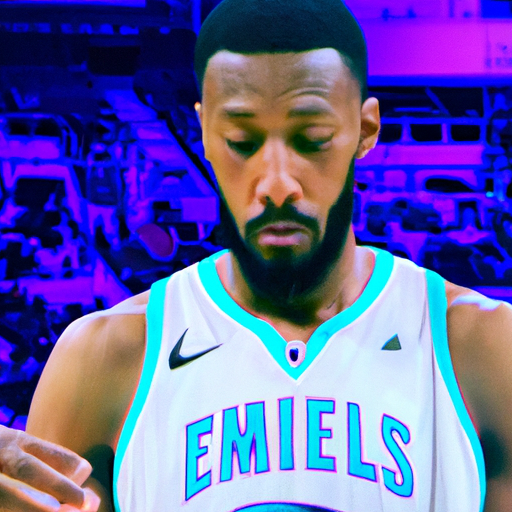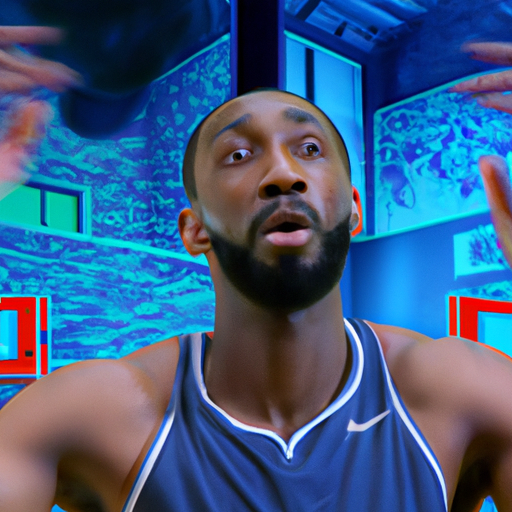Gilbert Arenas: Joel Embiid, not Ben Simmons, should take blame for 76ers’ playoff failures

Gilbert Arenas: Analyzing his impact on the NBA
Gilbert Arenas: Joel Embiid, not Ben Simmons, should take blame for 76ers’ playoff failures.
When it comes to analyzing the impact of Gilbert Arenas on the NBA, it is impossible to ignore his outspoken nature and willingness to share his opinions. One such opinion that has garnered attention recently is his belief that Joel Embiid, not Ben Simmons, should take the blame for the Philadelphia 76ers’ playoff failures. While this may seem like a controversial statement, it is worth examining the reasoning behind Arenas’ assertion.
Firstly, it is important to acknowledge that both Embiid and Simmons are integral parts of the 76ers’ roster. They are both immensely talented players who have shown flashes of brilliance throughout their careers. However, when it comes to the playoffs, it is crucial for star players to step up and perform at their best. This is where Arenas believes Embiid falls short.
Arenas argues that Embiid’s inconsistency and lack of discipline have been major factors in the 76ers’ playoff disappointments. He points to Embiid’s tendency to settle for outside shots instead of utilizing his dominant post presence as evidence of his shortcomings. Additionally, Arenas highlights Embiid’s struggles with conditioning and injuries, which have often limited his effectiveness on the court.
On the other hand, Arenas believes that Simmons should not shoulder the blame for the team’s playoff failures. While Simmons has faced criticism for his lack of a reliable jump shot, Arenas argues that his overall impact on the game cannot be overlooked. Simmons is an exceptional playmaker and defender, and his ability to create opportunities for his teammates is invaluable.
Furthermore, Arenas suggests that Simmons’ shortcomings can be mitigated by surrounding him with the right supporting cast. By surrounding Simmons with shooters who can stretch the floor, the 76ers can maximize his playmaking abilities and create a more balanced offensive attack. This, according to Arenas, is a more viable solution than placing the blame solely on Simmons.
It is worth noting that Arenas’ analysis is not without its detractors. Many argue that Simmons’ lack of a jump shot severely limits the 76ers’ offensive options, especially in the playoffs when defenses tighten up. They believe that Simmons’ inability to shoot from outside the paint makes it easier for opposing teams to game plan against him, ultimately hindering the team’s success.
However, Arenas’ perspective offers a fresh take on the situation. He challenges the notion that Simmons should be solely responsible for the team’s playoff failures and instead directs the blame towards Embiid. By doing so, Arenas encourages a more nuanced evaluation of the 76ers’ struggles and prompts a discussion on how the team can best utilize its star players.
In conclusion, Gilbert Arenas’ belief that Joel Embiid, not Ben Simmons, should take the blame for the Philadelphia 76ers’ playoff failures is a thought-provoking perspective. While it may be controversial, Arenas’ analysis highlights Embiid’s inconsistencies and lack of discipline as major factors in the team’s disappointments. By shifting the blame away from Simmons, Arenas encourages a more nuanced evaluation of the team’s struggles and prompts a discussion on how to best utilize its star players. Whether or not one agrees with Arenas’ viewpoint, his willingness to share his opinions and challenge conventional wisdom is a testament to his impact on the NBA.
The rise and fall of Gilbert Arenas: A career retrospective

Gilbert Arenas: Joel Embiid, not Ben Simmons, should take blame for 76ers’ playoff failures.
The rise and fall of Gilbert Arenas: A career retrospective.
Gilbert Arenas, once a rising star in the NBA, had a career filled with highs and lows. From his early success with the Golden State Warriors to his controversial exit from the Washington Wizards, Arenas left a lasting impact on the league. As we reflect on his career, it is important to examine his opinions on the current state of the Philadelphia 76ers and their playoff failures. In particular, Arenas believes that Joel Embiid, not Ben Simmons, should shoulder the blame for the team’s shortcomings.
Arenas argues that Embiid, the 76ers’ star center, has not lived up to expectations in the playoffs. Despite his undeniable talent and dominance during the regular season, Embiid has struggled to maintain that level of performance when it matters most. Arenas points to Embiid’s inconsistency and lack of assertiveness as key factors in the team’s playoff disappointments.
According to Arenas, Embiid’s tendency to settle for jump shots instead of attacking the basket has hindered the 76ers’ offensive flow. He believes that Embiid should utilize his size and strength to dominate in the paint, drawing fouls and creating opportunities for his teammates. By settling for outside shots, Arenas argues that Embiid is not maximizing his potential and is allowing opposing defenses to dictate the game.
Furthermore, Arenas criticizes Embiid’s lack of conditioning and fitness, which he believes has contributed to his struggles in the playoffs. He suggests that Embiid’s tendency to tire quickly and lose focus during crucial moments has cost the 76ers dearly. Arenas emphasizes the importance of maintaining peak physical condition throughout the grueling playoff schedule, and he believes that Embiid has failed to meet this requirement.
In contrast, Arenas defends Ben Simmons, the 76ers’ point guard, against the blame for the team’s playoff failures. He acknowledges Simmons’ limitations as a shooter but argues that his overall impact on the game cannot be overlooked. Simmons’ exceptional court vision, defensive prowess, and ability to create scoring opportunities for his teammates make him a valuable asset to the team.
Arenas believes that Simmons’ lack of shooting ability should not overshadow his other contributions. He argues that the 76ers’ struggles in the playoffs are not solely due to Simmons’ shortcomings but rather a collective failure of the team as a whole. Arenas suggests that the blame should be shared among the coaching staff, management, and the supporting cast, rather than solely placing it on Simmons’ shoulders.
As we reflect on Gilbert Arenas’ career and his opinions on the 76ers’ playoff failures, it is important to consider the validity of his arguments. While his perspective may be controversial, it offers a fresh take on the situation. Arenas’ insights shed light on the complexities of team dynamics and the challenges faced by star players in high-pressure situations.
Ultimately, the blame for the 76ers’ playoff failures cannot be placed solely on one player. It is a collective effort that requires each member of the team to perform at their best. As we move forward, it is crucial to learn from these failures and make the necessary adjustments to ensure future success. Only then can the 76ers rise above their past disappointments and reach their full potential.
Gilbert Arenas vs. Joel Embiid: Comparing their impact on their respective teams
Gilbert Arenas, a former NBA player known for his sharp shooting and controversial opinions, recently made headlines with his assertion that Joel Embiid, not Ben Simmons, should shoulder the blame for the Philadelphia 76ers’ playoff failures. This statement has sparked a heated debate among basketball fans and analysts alike. In order to fully understand Arenas’ perspective, it is important to compare the impact of both players on their respective teams.
Joel Embiid, the towering center for the 76ers, has been hailed as one of the most dominant big men in the league. His combination of size, skill, and agility makes him a force to be reckoned with on both ends of the court. Embiid’s ability to score in the paint, rebound, and protect the rim has been instrumental in the 76ers’ success over the years. His presence alone commands attention from opposing defenses, opening up opportunities for his teammates to score.
On the other hand, Ben Simmons, the 76ers’ point guard, is known for his exceptional court vision and playmaking abilities. Simmons possesses a unique blend of size, speed, and ball-handling skills that allows him to create scoring opportunities for himself and his teammates. His ability to drive to the basket and find open shooters has been a key component of the 76ers’ offensive strategy. Additionally, Simmons’ defensive prowess has made him a valuable asset on that end of the court.
While both players have undoubtedly made significant contributions to the 76ers’ success, it is important to evaluate their performances in the context of the team’s playoff failures. Arenas argues that Embiid should take the blame because of his inconsistent performances in crucial playoff games. He points to Embiid’s tendency to disappear in high-pressure situations and his inability to consistently deliver when it matters most.
Arenas also highlights Embiid’s health concerns as a factor that has hindered the 76ers’ playoff aspirations. The center has been plagued by various injuries throughout his career, causing him to miss significant playing time during crucial stretches of the season. This absence has undoubtedly had an impact on the team’s chemistry and overall performance.
On the other hand, Arenas believes that Simmons should not be held solely responsible for the team’s playoff failures. While Simmons has faced criticism for his lack of a reliable jump shot, Arenas argues that his overall impact on the game cannot be overlooked. Simmons’ ability to facilitate the offense and create scoring opportunities for his teammates has been a crucial aspect of the 76ers’ success.
In conclusion, Gilbert Arenas’ assertion that Joel Embiid, not Ben Simmons, should take the blame for the Philadelphia 76ers’ playoff failures has sparked a contentious debate among basketball fans and analysts. While both players have made significant contributions to the team’s success, it is important to evaluate their performances in the context of the team’s playoff failures. Embiid’s inconsistent performances and health concerns have been cited as reasons for his accountability, while Simmons’ overall impact on the game cannot be overlooked. Ultimately, the responsibility for the team’s playoff failures should be shared among all players and coaching staff, as basketball is a team sport that requires collective effort to succeed.

